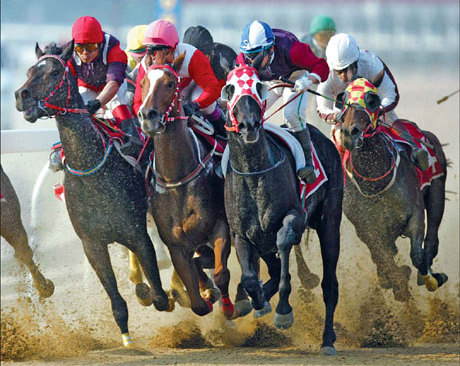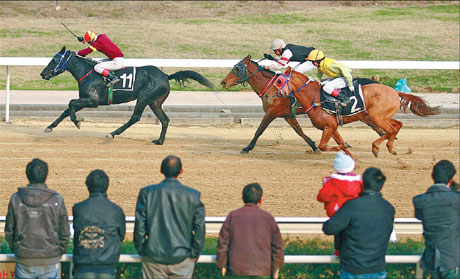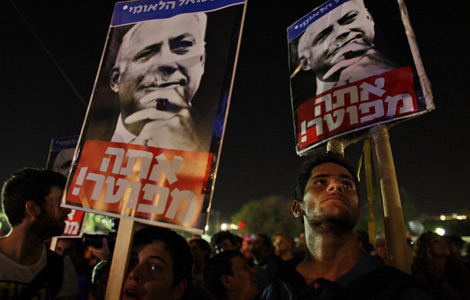When will the horses run?
Updated: 2011-08-07 09:29
By Duan Yan (China Daily)
|
|||||||||||
Although horse racing in Hong Kong and Macao has enjoyed a long and illustrious history, the Chinese mainland has been slow to introduce betting on the racetracks. We look at some of the issues at stake, with Duan Yan reporting from Wuhan in Hubei province.
It is a very different scenario from the traditional racetrack. When the horses gallop on the dirt track at Wuhan's Orient Lucky City, Hu Wenkang is fidgeting in the front row of the stands, his eyes glued to the big digital display. Instead of cheering for the winning jockey, the retired history teacher is waiting impatiently for the raffle draw in-between races. That's his only chance of winning something. Betting on the horses is not allowed, so Hu has no stake in the race, just like the other race-goers on the stands, a few hundred spread out in a stadium that can hold 30,000. Last year, the organizers had given out a "small prize for guessing the winning horse", but that's no longer allowed.
 |
|
In Wuhan, the horses are off and running, but the punters are left holding tickets that earn them shopping vouchers in raffles held in-between races. [Provided to China Daily] |
With that ruling, track owners in Wuhan and elsewhere - who had collectively bet millions that wagering on horse races was coming to the Chinese mainland by heavily investing in the tracks - are left holding tickets they may not be able to cash.
Betting is illegal in China and the central government is quick to pounce on anything that resembles organized gambling.
"The media had misinterpreted our meaning. The small prize for guessing the winner is nothing like the betting of Hong Kong's horse racing," Liu Hongqing, spokesman for Wuhan's Orient Lucky City racecourse, defended the "small prize".
The Wuhan races are organized by the Hubei provincial government and run by Orient Lucky Horse Industry (Wuhan) Co Ltd, an enterprise based in Hong Kong.
Liu repeatedly stressed the difference between Hong Kong-style horse betting and the "guessing game" that involved only fixed-price tickets. In Hong Kong and Macao, punters are allowed to bet any amount on tickets that will increase their chances of winning based on a traditional system that calculates the odds.
The fact that Wuhan was allowed to run the races had fueled speculations that China may lift the ban on horse betting in the mainland. Rumors of that have circulated in recent years, and there have been investors who have taken a stake in the odds - by building racetracks.
It is not only Wuhan which is hopeful and willing to push the OB markers. Cities like Beijing and Guangzhou, too, have had a history of testing the waters, and failing.
Nonetheless, the enthusiasm has not been dampened. Across China, cities like Chengdu, Nanjing, Chongqing, Jinan as well as Hainan province are all building racetracks and sitting on the fences waiting for the day when the central government finally relaxes the ban.
But, the signals are still mixed.
The General Administration of Sports, which gave the go-ahead for the Wuhan races, put the lid on speculation by making an announcement on June 10 that stated it never approved of any form of "prize winning guessing" activities in Olympic equestrian and traditional speed racing events.
For Orient Lucky's Liu, the announcement was a "heavy blow" not only to the event itself, but also to China's horse racing prospects because the key element was now out of the picture.
Besides the hopeful track owners, how does the Administration's announcement affect layman punters like Hu Wenkang? He was also at the track last September when there was still the guessing game.
"There was a horse race and I bet on the No 2 horse. I won a shopping voucher worth 100 yuan." Hu wished he had bought more tickets then. "There were people who were much smarter than I was, and bought many tickets so they could bet on more numbers and win more prizes."
This year, Hu is collecting entrance tickets with raffle numbers, and waits for the chance to win vouchers in-between races.
"It's a very profitable business for the racetrack owners and rich people, but I don't think the industry will benefit locals that much," Hu says. "A small amount of gambling is not so bad after all, and should be allowed when people's living standards have improved."
 |
|
The horses are running in the Chinese mainland, but with the betting element removed from this traditional game, race-goers are left slightly bewildered at the tracks. [Photos provided to China Daily] |
Hot Topics
Philippines President Benigno Aquino III (C) plants a tree with Chinese government officials at a clan hall in Hongjian village, Zhangzhou city of East China's Fujian province, on Saturday.
Editor's Picks

|

|

|

|

|

|







